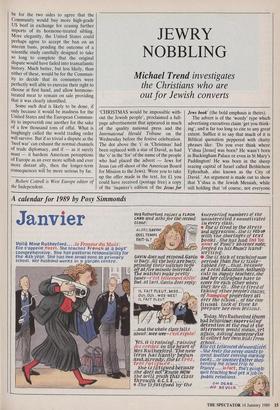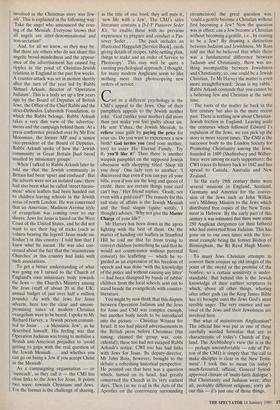JEWRY NOBBLING
Michael Trend investigates
the Christians who are out for Jewish converts
'CHRISTMAS would be impossible with- out the Jewish people', proclaimed a full- page advertisement that appeared in much of the quality national press and the International Herald Tribune on the Wednesday before the festive celebration. The dot above the T in 'Christmas' had been replaced with a star of David, as had the 'o' in the 'for' of the name of the people who had placed the advert — Jews for Jesus (an off-shoot of the American Board for Mission to the Jews). Were you to take up the offer made in the text, for £1 you could have received (postage free) a copy of the 'inquirer's edition of the Jesus for Jews book' (the bold emphasis is theirs).
The advert is of the 'wordy' type which advertising executives claim 'get you think- ing', and is far too long to cite to any great extent. Suffice it to say that much of it is Biblical quotation peppered with chatty phrases like: 'Do you ever think where Y'shua [Jesus] was born? He wasn't born in Buckingham Palace or even in St Mary's Paddington! He was born in the sheep rearing capital of Israel called Bethlehem Ephrathah, also known as the City of David.' An argument is made out to show that Y'shua is the Jewish Messiah, while still holding that 'of course, not everyone involved in the Christmas story was Jew- ish'. This is explained in the following way: `Take the angel who announced the com- ing of the Messiah. Everyone knows that all angels are inter-denominational and non-sectarian!'
And, for all we know, so they may be. But there are others who do not share this angelic broad-mindedness and the appear- ance of the advertisement has caused big ripples in the pond of Christian-Jewish relations in England in the past few weeks. A counter-attack was set in motion shortly after the turn of the year led by Rabbi Shmuel Arkush, director of 'Operation Judaism'. This is a body set up a few years ago by the Board of Deputies of British Jews, the Office of the Chief Rabbi and the strict-Orthodox Lubavitch Foundation, to which the Rabbi belongs. Rabbi Arkush takes a very dim view of the advertise- ments and the campaign behind them. At a press conference presided over by Mr Eric Moonman, the former MP and a senior vice-president of the Board of Deputies, Rabbi Arkush spoke of how the 'Jewish community in Great Britain [had been] assailed by missionary groups'.
When I talked to Rabbi Arkush later he told me that the Jewish community in Britain had been 'upset and confused'. But the adverts were not an isolated case; there had also been what he called 'street harass- ment' when leaflets had been handed out to children leaving schools in the Jewish areas of north London. He was concerned that an American, Madison Avenue style of evangelism was coming over to our shores. Jews for Jesus is based on the West Coast of the United States, and he did not want to see their bag of tricks (such as t-shirts bearing the legend 'Jesus made me kosher') in this country. I told him that I knew what he meant. He was also con- cerned about the fact that the 'mainstream Churches' in this country had links with such associations.
To get a better understanding of what was going on I turned to the Church of England's own missionary body towards the Jews — the Church's Ministry among the Jews (staff of about 20 in the UK; annual budget of just over half a million pounds). As with the Jews for Jesus adverts, here too the clear and uncom- promising tones of modern Christian evangelism were to be heard. I spoke to Mr Richard Harvey, a 'Jewish person commit- ted to Jesus . . . a Messianic Jew', as he described himself. His feeling was that Operation Judaism was trying to mobilise a British anti-American prejudice to 'avoid getting to grips with the real question of the Jewish Messiah . . . and whether you can go on being a Jew if you accept Christ as the Messiah'.
As a campaigning organisation — or `outreach', as they call it — the CMJ has close links to the Jews for Jesus. It points two ways: towards Christians and Jews. For the former is the challenge of sharing,
as the title of one book they sell puts it, `new life with a Jew'. The CMJ's sales literature contains a D-I-Y Passover Seder Kit, `to enable those with no previous experience to prepare and conduct a Pas- sover Seder . . . . The pack includes an illustrated Haggadah [Service Book], cards giving details of recipes, table-setting plan, things to make and an order of Service to Photocopy'. This may well be quite a cunning psychological approach, I thought, for many modern Anglicans seem to like nothing more than photocopying new orders of service.
Cast in a different psychology is the CMJ's appeal to the Jews. One of their pamphlets appeals to the Jewish mother joke. 'God (unlike your mother) did more than just make you feel guilty about sin. He sent Y'shua, the Jewish Messiah, to relieve your guilt by paying the price for your sin. Do you want to experience a new birth? God invites you (and your mother, too) to enter His Eternal Family. Try it, you'll like it!' Then there is another waspish pamphlet on the supposed Jewish obsession with shopping titled 'Shop till you drop'. One lady says to another: 'I discovered that even if you can pay all your bills, even if you are the king and queen of credit, there are certain things your card can't buy.' Her friend replies: 'Oooh, not even with a gold card?' The remedy for this sad state of affairs is the Jewish Messiah and the final slogan (quite wittily, I thought) advises, 'Why not give the Master Charge of your life?'
Mr Harvey has been down in the agora fighting with the best of them. On the matter of handing out leaflets in Stamford Hill he told me that far from trying to convert children (something he said that he would not countenance without parental consent) his leafleting — which he re- garded as an expression of his freedom of speech and was done 'with the knowledge of the police and without causing any litter' — had been disrupted by bands of rabbis' children from the local schools sent out to stand beside the evangelicals with counter- literature.
You might by now think that this dispute between Operation Judaism and the Jews for Jesus and CMJ was complex enough, but another body needs to be introduced into the picture — Christian Witness for Israel. It too had placed advertisements in the British press before Christmas (the timing, claimed the group was, coin- cidental); these too had not escaped Rabbi Arkush's notice. CWI too has had links with Jews for Jesus. Its deputy-director, Mr John Ross, however, brought to the debate a refreshing historical perspective. He pointed out that here was a question which, turned on its head, had greatly concerned the Church in its very earliest days. Then (as we read in the Acts of the Apostles on the controversy surrounding circumcision) the great question was: `could a gentile become a Christian without first becoming a Jew? Now the question was in effect: can a Jew become a Christian without becoming a gentile, i.e., by ceasing to be a Jew? By drawing a distinction between Judaism and Jewishness, Mr Ross told me that he believed that while there was a fundamental difference between Judaism and Christianity, there was no- thing incompatible between Jewishness and Christianity; so, one could be a Jewish Christian. To Mr Harvey the matter is even more straightforward: 'Jesus is my rabbi.' Rabbi Arkush contends that you cannot be a believing Jew and Christian at the same time.
The roots of the matter lie back in the first century but also in the more recent past. There is nothing new about Christian- Jewish friction in England. Leaving aside the centuries which followed Edward I's expulsion of the Jews, we can pick up the story in more recent times. The CMJ is the successor body to the London Society for Promoting Christianity among the Jews, founded in 1809 (Shaftesbury and Wilber- force were among its early supporters); the CWI traces its history back to 1842 and has spread to Canada, Australia and New Zealand.
In the early 19th century there were several missions in England, Scotland, Germany and America for the conver- sion of the Jews such as John Wilkin- son's Mildmay Mission to the Jews which distributed free copies of the New Testa- ment in Hebrew. By the early part of this century it was estimated that there were some 250 Anglican clergymen (or their fathers) who had converted from Judaism. This has gone on to our own times with the fore- most example being the former Bishop of Birmingham, the Rt Revd Hugh Monte- fibre.
To many Jews Christian attempts to convert them conjure up old images of the point of the sword or the promise of the bonfire; so a certain sensitivity is under- standable. But behind this is the Jewish knowledge of their earliest scriptures in which, above all other things, whoring after other gods (as the King James Bible has it) brought onto the Jews God's most terrible anger. The very essence and sur- vival of the Jews and their Jewishness are involved here.
But what of mainstream Anglicanism? The official line was put in one of those carefully worded formulae that are so characteristic of today's Church of Eng- land. The Archbishop's view (he is in the — perhaps uncomfortable — role of Pat- ron of the CMJ) is simply that 'the call to make disciples is clear in the New Testa- ment'. I took this to mean (in today's much-favoured, official, General Synod- approved climate of 'multi-faith dialogue') that Christianity and Judaism were, after all, probably different religions; sorry ab- out this — it's just one of those things.



















































 Previous page
Previous page